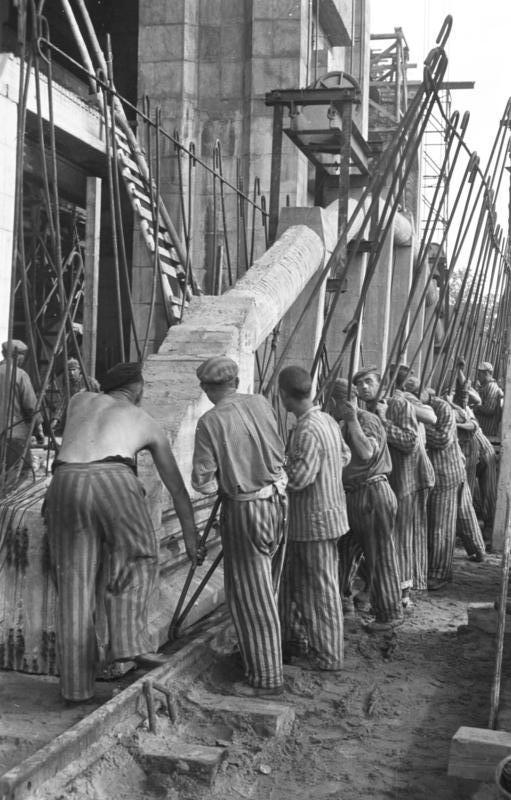I will not "like" this chapter, but your writing is impressive. Have you created these citations from nothing, or simiiar theories were publicized OTL?
Thanks! As far as I know, the theory of a "Nordic master race" is hardly new, but the Nazis' intensity of belief in it is made up.
I only liked it out of appreciation for how the author managed to take crazy Nazi race theories and invent an even crazier variant. That's a characteristic of a good writer.
Thanks, I figured that
I'll just disagree on that blood sport thing . . . Though the Nordist thing is interesting.
I'd have assumed that it would be rather hard for Nordism to gain the advantage over Aryanism, if only because Aryanist would be able to say that Hitler was an Aryanist.
Someone promoting Nordism is kind of implicitly stating that Hitler was wrong. For that reason alone, I'd assume it'd be an unpopular stance.
Well, Hitler's dead. He can't really say anything one way or another anymore. There was a limited degree of deviation from established doctrine even during Hitler's lifetime (see the crazy religious beliefs of Heinrich Himmler and some of his SS buddies), and I think a Fuhrer coming from the cutting-edge-crazy SS would embrace Nordicism.
Wow, you're good. You actually were able to rationally explain the irrational shit. The Nazis are insane - still funny how Goering managed to not be completely nuts - but you describe their insanity well. Lol, those university titles were awesome in an unsettling way; although the OTL Politicizing Beyonce still takes the cake for most insane class title.
That we are writing of the Third Reich descending into madness - when they were clearly mad to begin with - is amazing. Burn baby, burn
Those university titles are all OTL.
Speaking of that chapter, How did Italian fascism Evolved?
Fascism in Italy is pretty much as it was in the twentues, albeit a bit less anticlerical.
Don't sell yourself short. I very much enjoy what you write.
How much of a collaborationist is this pope? Is he writing papal bulls supporting the mass murder of Jews and Poles, and the suppression of Catholicism in Germany proper? Or is he merely making noise about the horrors while squatting in the Vatican?
If he is doing the former, he might seriously alienate Catholics outside of Europe. The American people are becoming increasingly anti-Nazi, so I think American Catholics might be horribly disillusioned seeing their spiritual leader praising the most monstrous crimes ever, especially those of Irish descent. Would South and Central Americans also be going through a painful moral dilemma as they see the Vatican turning a blind eye to some god-less crimes?
Pope Gregory XVII isn't supporting Nazi atrocities, but he isn't speaking out against them, either. He's also chummy with the Catholic fascists because they give the Church plenty of power and authority.
SirPaperwright, how is computing tech in this TL?
I'll need to do more research before I can say.
Is there a situation where there are two Popes (with the anti-Fascist Pope being in Latin America) or is there still a single unified Papacy?
Nope. One, unified Papacy.
What are the Irish doing? Trying to become the new Switzerland?
Ireland is neutral in the Cold War; the Northern Ireland conflict is keeping Dublin out of the Rio Pact.
Was there interment of Japanese-Americans like OTL?
A little, but not to the extent of OTL; Japanese-Americans supported the American war effort overwhelmingly, although the destructive aftermath is more divisive.
what happend to the american communists after the destructon of the soviet union
American commies weren't really relevant in the first place, but they see the new Russia as a counterrevolutionary force and they're divided on how to view China.
I'm just going to point out that Pope Pius XII has a forest in Israel named for him. For the last decade, there has been a push to recognize him as Yad Vashim.
People who lick Nazi bootheels tend not to be the kind of people honored so highly by Israeli Jews.
Pius XII isn't the Pope ITTL. IOTL, Valerio Valeri (the cardinal who ITTL became Pope Gregory XVII) collaborated with the Vichy regime in France.
The biggest winner in all of this is going to be China. With earlier social and economical liberalization, not to mention US aid and no cultural revolution.
When will China detonate its first nuke?
About the same time as OTL, so mid-1960s.
so are the american parties united when it comes to foreign policy.
Pretty much.


